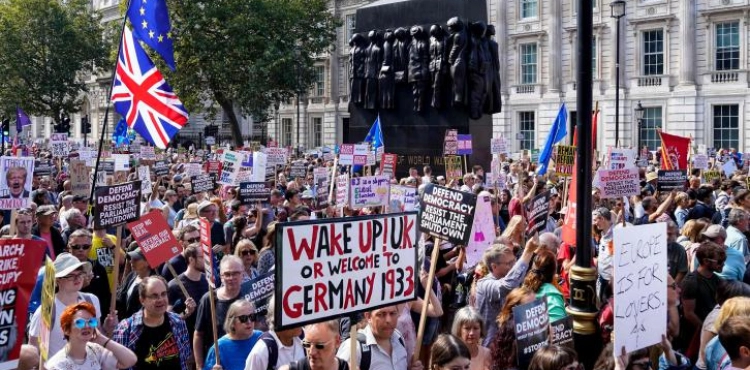Thousands of people marched in several British cities on Saturday to protest Prime Minister Boris Johnson´s decision to suspend parliament shortly before Brexit, a move denounced by Johnson´s opponents as a "coup". ".
The demonstrations come a week before the British political scene tense as Johnson´s opponents will seek to stop his decision in the courts and a decision against Brexit without an agreement, and may also try to overthrow the government by a vote of no confidence.
Thousands have taken to the streets in many British cities and towns since morning, and organizers of the "Stop the Coup" rallies said they hoped hundreds of thousands would take part.
Momentum, an alliance with the main opposition Labor Party, also called for "occupation of bridges and banditry".
Crowds have gathered in Manchester, York and Newcastle in the north of England, and the Scottish cities of Edinburgh and Belfast in Northern Ireland. Events are also planned in about 30 locations.
The biggest demonstrations were expected in London, where thousands of people were beeping, drumming, waving European Union flags and gathering outside the government headquarters at lunchtime, chanting "Boris Johnson shame on you."
They also carried placards reading "Defend democracy: resist closing the parliament", "Wake up Britain" and "Welcome to Germany in 1933".
"The decision on what will happen to Brexit should not be for Johnson," said Bernard Hurley, 71, a Westminster demonstrator.
"The decision was taken from parliament, which is undemocratic," he said.
About a dozen skinheads, wrapped around their bodies, marched through the British flag, through the crowds accompanied by police, shouting "What do you want? Brexit! When do you want it? Now."
Johnson, who came to power a month ago after a Conservative election, promised to lead Britain out of the EU with or without an agreement with Brussels.
He said he was ready to reach an agreement with the EU if the item on his country´s stay in the customs union after Brexit was removed from the current agreement before Theresa May.
But EU leaders said they were waiting for concrete proposals from London.
Johnson´s Brexit adviser David Frost is expected to return to Brussels for talks next week.
Opposition MPs and a number of conservatives from Johnson want to delay Brexit until October 31 if he fails to reach an agreement with the European Union.
However, the government is stepping up preparations in the absence of an agreement.
On Saturday, Finance Minister Sajid Javed defended the suspension of parliament despite saying during a recent Conservative leadership contest that "you cannot practice democracy by abolishing democracy."
He told BBC radio that parliament "normally meets only in late September and early October."
On Friday, Johnson warned lawmakers not to try to block his plans, saying the decision to postpone Brexit again would do "lasting damage" to people´s confidence in politics.
He said opposition efforts could in fact lead to Brexit without an agreement because it would make the Europeans less willing to compromise if they thought Brexit could be stopped.
The Prime Minister of the United Kingdom has the right to suspend Parliament after obtaining the Queen´s approval, which he traditionally does during political party conferences in September.
But this time the condemnation among opponents of an exit without a deal from the European Union was the timing and duration of the suspension, which is expected to last for five weeks.
It is suspected that Johnson wants in this comment to prevent deputies from blocking Brexit without an agreement he intends to implement in the absence of a settlement with the European Union on the terms of the exit from the UK.
The prime minister defended his decision, stressing that he wanted to use that time to prepare and present his national policy agenda after he came to power in July.
"We cannot rely solely on the courts and the parliamentary process to save the situation. We have every right to hear our voices," the organizers said on their website.
This comes a day after Hanson announced an acceleration of meetings between British and European negotiators, who will meet twice a week in Brussels in September.
The purpose of these meetings is to find a solution to the most thorny issues in Brexit, the “safety net” clause in Theresa May´s agreement with Brussels to prevent the return of an effective border between Northern Ireland and the Republic of Ireland. Boris Johnson rejects the provision.
The “safety net” provides for the entire UK to remain in a “unified customs framework” with the EU unless a better solution is found at the end of the transition.
Scotland´s highest civil court will examine Tuesday a request from pro-European lawmakers to challenge the suspension of parliament, after Friday´s refusal to do so in an emergency.
Former Conservative Prime Minister John Major joined another lawsuit by anti-Brexit activist Gina Miller, and the hearing is expected to take place on 5 September in London.
Thousands have demonstrated in the UK since parliament was suspended on Wednesday, while an anti-suspension petition since Friday has raised 1.6 million signatures.












